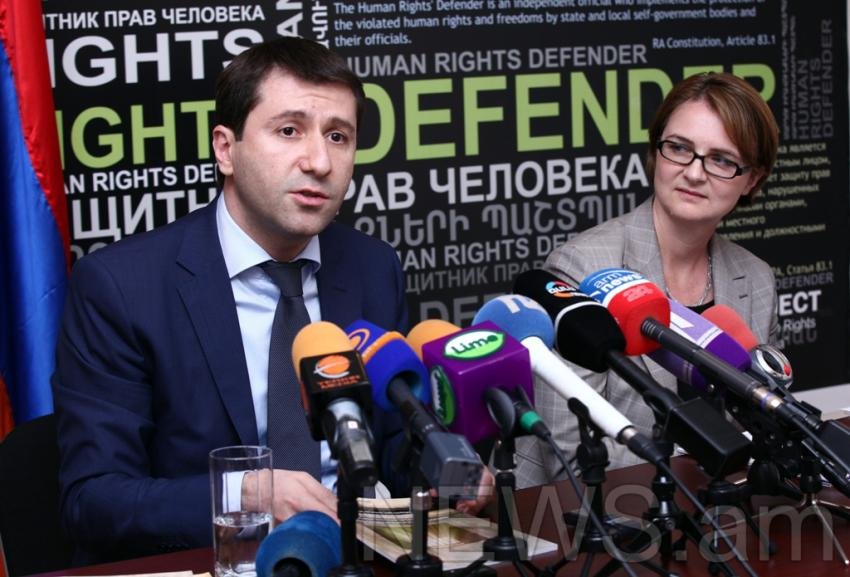NON-GOVERNMENTAL ORGANIZATION
The Ombudsman Will Not Fight Against Torture If State Funding Is Not Provided

Today the Armenian Human Rights Defender Karen Andreasyan and the
UK Ambassador to Armenia Katherine Leach
following a visit to “Noubarashen” penitentiary
institution met with journalists to present their impressions and the Interim Report
of the Ombudsman on Prevention of Torture and Other Inhuman Treatment.
In 2013 the Council on Torture Prevention under the Ombudsman
office, composed of different NGOs, including Civil Society Institute, made 133
visits to different closed and semi-closed institutions, writing down the
results of visits in the interim report.
According to the Ombudsman, the main issue at penitentiary
institutions, which continues to last for a long time, is that they remain overcrowded.
“Today we were at a place, where 16 people lived in a cell
designed for 12 persons, and during our visit there were convicts who were
sleeping and did not meet us, because they would not miss their turn to sleep.
Even the worst criminals do not deserve to live in such inhuman conditions,” stated
Karen Andreasyan. He also added that the right of detainees to one hour walk is
restricted under these conditions, and all these he considers as torture.
When speaking about issues the Ambassador firstly noted the
“miserable” conditions of the building of “Noubarashen” penitentiary
institution.
“I am informed that a new detention place shall be built, however,
in any case these people still are in this building and there is no place to
walk or move, and these people are not yet convicts but just detainees in
pre-trial detention,” said Katherine Leach, suggesting exercise of alternative measures
of restrain for pre-trial stage, and using alternative means of punishment and
probation for convicts as a solution.
“As one of the ministers noted, a prison is an expensive
instrument to make bad people even worse... Only those who are dangerous or
those with high risk for escape should be imprisoned,” believes the Ambassador.
The Ombudsman shared a statement from Stepan, a life prisoner who
has been imprisoned for a long time: “He asked to pass on behalf of all imprisoned
people that it could not continue this way, one day it would blow up.”
It will blow up, because, according to the Ombudsman, there are poor
living conditions, bad and unfair courts, imperfect system of review of
punishment, and indifference.
Cases of self-injuries at penitentiary institutions Karen
Andreasyan also considers as “a result of rulings of bad courts”.
“When you talk with convicts, they complain not about the penitentiary
institution, but about unfair court verdicts... Sense of injustice and attempts
of self-injuries, I believe, are the results of bad judicial system,” he says.
The Ombudsman reminded that in 2013, during discussions of the
state budget, he requested 11 million AMD from the Armenian Government for
activities of National Mechanism for Prevention of Torture, which would allow visiting
closed and semi-closed institutions more frequently. But the Government dismissed
his request, and this activity was implemented with the financial support of
the British Embassy.
In reply to www.hra.am journalist’s question “Does refusal of
funding request mean that in reality the Government has no will to combat torture?”,
Karen Andreasyan answered that he would not say that the state does not want
better conditions and deliberately did not provide money for visiting prisons.
It simply means that the state has a limited budget, and the government has
other priorities.
“I mentioned on many occasions that if the budget is managed and
distributed properly, if the financial means are wisely spent, then, believe
me, the needed means could be identified. 10-15 million AMD is such an
insignificant sum compared to other state expenditures,” he noted.
He already announced that he would no longer fight against torture
with funding provided through grants. Since the beginning of 2013 the National
Mechanism for Prevention of Torture has worked with the support of financial means
provided by the British Embassy and partner organizations, and in
September-November its work will be covered as a result of savings of the
Ombudsman's office.
“It might sound as blackmailing but as of 1 January 2014 if there
is no state funding starting I will not implement the duties imposed on me by
the law,” announced Karen Andreasyan.
The 2013 Interim Report raised a series of issues regarding places
of detention, police stations, and places of keeping arrestees under police
authority, military units of the Armenian Ministry of Defense, special schools,
boarding institutions, orphanages, as well as psychiatric institutions and
institutions of social care.

